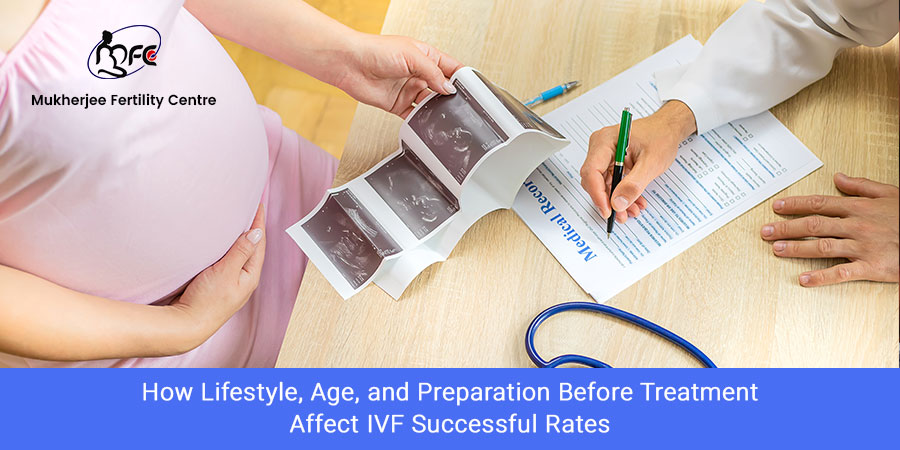
How Lifestyle, Age, and Preparation Before Treatment Affect IVF Successful Rates
By MFC on 15,Oct 2023
The procedure of in vitro fertilization (IVF) has become a beacon of hope for people and couples who are having trouble getting pregnant. An IVF outcome may be affected by a number of factors, including planning before treatment, living choices, and age. The success rates of IVF will be greatly affected by these important factors, which we will look at in detail in this lesson.
Age Matters for IVF Success
One important thing that affects how well IVF works is age. Fetal deaths that come with getting older, especially for women, don't stay the same over time. Individuals who are considering fertility treatment need to know how age impacts the success of IVF.
Female Age and Success with IVF
- Ovarian Reserve: A woman's ovarian reserve, or the number and quality of her eggs, decreases as she ages. If this happens, it could affect both the number and quality of eggs that are recovered during IVF. Consequently, IVF success rates might be lower for women over 35.
- Chance of Miscarriage: Older women have a higher chance of miscarrying even when IVF works. Aging-related chromosomal problems in fetuses are partly to blame for this.
- Implantation Rates: Embryos are more likely to connect successfully to the lining of the uterus in younger women and older women.
- Rates of Live Births: Men and women over 40 tend to have a lot fewer live births after IVF. With age, a woman's chances of having a healthy baby diminish.
Men's Age and IVF Success
IVF results can be affected by both the woman's age and her partner's age. More advanced father age has slightly increased the risk of a number of genetic disorders, but this effect on IVF success rates is usually not as strong as it is when compared to female age.
Age-Related Considerations: What to Do
Anyone thinking about IVF treatment because of age-related issues should consider the following:
- IVF success rates are usually higher for younger couples, whose partners are in their best years for having children. They might start by choosing less extreme forms of care.
- Advanced Maternal Age: Women over 35 may think about IVF earlier, especially if they have had trouble getting pregnant in the past. At the earliest convenience, you should talk to a fertility expert.
- Genetic counseling: growing eggs with chromosomal problems are more likely to happen in older women. Genetic advice and preimplantation genetic testing (PGT) may both be choices.
Infertility Success and Lifestyle Factors
Lifestyle choices can have a big effect on the success rates of IVF. Individuals can make some decisions about their lifestyle, but when they are getting reproductive treatment, they may need to change others.
- BMI (body mass index)
- Smoking and drinking alcohol
- Stress and feeling good emotionally
- Nutrition and Diet
- Do exercises
Obesity is strongly linked to infertility. Individuals who are both overweight and underweight may have lower success rates with IVF. For women with low BMI, menstrual cycles may be inconsistent or not happen at all, while for women with high BMI, hormonal imbalances may happen.
Recommendation: According to the advice, eating right and working out can help keep your BMI in a healthy range. Seeking advice from a nutritionist can be helpful.
Extreme drinking and smoking makes it harder for both men and women to get pregnant. These actions may impact the number and quality of sperm and eggs, as well as their ability to grow.
Recommendation: Stopping smoking and drinking less booze can help with fertility and IVF success rates. Help from medical workers or counseling services can be advantageous.
Anxiety and fertility are closely linked. Hormones can't work as well when you're under a lot of stress, and the chances of IVF working are lower.
Recommendation: To make your IVF trip better, it is suggested that you include stress-relieving activities like yoga, meditation, or counseling in your daily schedule.
A balanced diet high in important nutrients is needed for good reproduction. Semen and eggs can be affected by bad eating habits.
Expert advice: Talk to a nutritionist about making a diet that is good for fertility and full of different foods that are important for reproductive health.
A healthy lifestyle includes regular physical activity. However, too much or too hard of an exercise routine could hurt fertility. Finding balance is important.
Recommendation: It is best to exercise in a way that increases your overall health without putting too much stress on your body.
Why pre-treatment planning is important
The success rates of IVF treatments can be greatly improved by doing a lot of work before starting. Stepping up your efforts to enhance your sexual health can be beneficial.
- Testing for Fertility
- Switching up your lifestyle
- Drugs and vitamin supplements
- Providing emotional support
- Planning your finances
Prior to starting IVF, a full fertility test could show any underlying issues that need to be fixed. This might include checking the quality of the sperm, looking for problems with the body's structure, and checking the amounts of hormones.
Advice: It is suggested that you talk to a fertility doctor who can fully design your IVF treatment plan.
Approaching parts of living that can hurt fertility should be given top priority. Giving up smoking, drinking alcohol in moderation, getting a healthy body mass index (BMI), and using stress-reduction techniques are some examples.
Advice: Start making these changes a long time before your IVF process so that your body has time to adjust easily.
Occasionally, doctors may recommend drugs or nutritional supplements to help women get pregnant. For example, people who have problems with their hormones may benefit from hormone therapy.
Advice: Do not use drugs or products to increase your chances of getting pregnant without first talking to your doctor.
Preparing mentally for IVF is just as important. Realize that the process might require toughness because it could be hard on your emotions.
Help is available from close friends, family, or a doctor who specializes in fertility problems.
IVF can be expensive, which can make worries about money affect your experience. Thoughtfully create a budget to manage the money you spend on therapy.
Advice: To save money on reproductive treatments, look into savings options, financial aid programs, and insurance coverage choices.
Conclusion
IVF success rates are affected by age, living choices, and planning before treatment. Knowing these things and taking steps to improve your sexual health can make your chances of success higher. Conferring with a fertility specialist is an important first step on the road to motherhood. They can give you specific advice based on your case. The Mukherjee Fertility Centre led by Dr. Shiuli Mukherjee can help you get pregnant and give you expert advice. With compassion and individual attention, Mukherjee Fertility Centre is dedicated to helping individuals and couples who are looking for fertility options. For your fertility journey, we offer a supportive setting with a team of experienced specialists and cutting-edge facilities. Talking to your doctor at Mukherjee Fertility Centre about any other questions you have about IVF treatment is the best way to get complete answers.
Contact us for more information by calling 033 2654 0115 / 9874064710, or you can easily make an appointment on our website at www.mukherjeefertilitycentre.com.
Starting here is the first step in learning about IVF and your other choices. There is help and advice available to you right here. Do not be afraid to take the next step on your way to becoming a parents. Don't wait—contact us today. Remember that IVF can help with infertility problems and, with the right plan, can facilitate the birth of a child.









